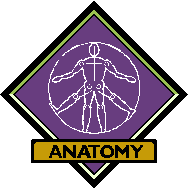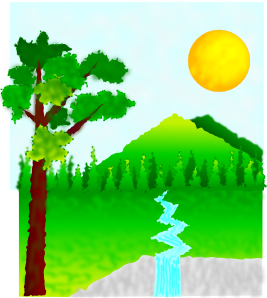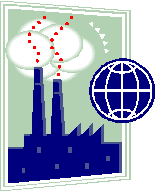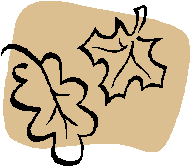click on icon to go to that website
|
||||||||||||||||||||||||||||||||||||||||||||||||||||||||||||||||||||||||||||
|
Environmental Science - BIOL 1103 Section 02
Spring 2015
Instructor:
Joan McKearnan
Office: S108 Phone numbers:
Office: 763- 433-1232
Faculty support:
Robin, x1354 E-mail:
joan.mckearnan@anokaramsey.edu Website:
webs.anokaramsey.edu/mckearnan
Office hours:
TW 12-1pm Th 2-3pm, F 9-11am
(in S150) or by appointment Lecture meeting time:
TTh 8-9:15am
Required Textbook:
Withgott, J.H. and M. Laposata. 2014. Environment: the science
behind the stories, 5th ed.
Benjamin Cummings
Plus Mastering Environmental Science
Official communication:
Your e-mail account registered on D2L is considered
the official method of communication in this course.
You are responsible for any announcements I make within 24 hours
of class time, so check it every day.
Desire to Learn:
D2L will be used for recording grades, posting
lecture notes and recorded lectures, and depositing homework assignments
as required by specific assignments or for late work
General Course Purpose:
Introduction to the basic characteristics and dynamics of ecosystems.
The effects of the increasing and changing human demands on our
environment are explored. Meets MnTC Goal 3 and 10.
Class activities:
Material is presented in lecture and in group activities.
At the beginning of each chapter, there is a reading assignment
and students are expected to come to class having done that assignment
and completed the Mastering Environmental Science pre-lecture quiz
associated with it. There
will be several group activities that will mostly be done in class but
may require individual preparation outside of class time.
Cooperative work is essential to
learning in this class and it is expected that each student come to
class prepared to participate.
Students should expect to spend some time outside of the class in
group activities. Feel
free to ask questions before, during or after lecture.
Grading:
Lecture grade is based on four lecture exams given during the lecture
period and a final exam given on Thursday, 14 May, 7:30-9:30am.
There will be several small group discussions or activities
conducted during class time that will be turned in for credit.
Each group activity varies in points, but member
participation is key to group success.
Each student will be periodically surveyed on their group
members participation. They
will be asked to indicate how much each person contributes to group
activities, including coming to class prepared.
If a student is assessed by his/her group mates to be
contributing more or less than 100%, his/her group grade will be
multiplied by whatever percent his group perceives s/he participates.
Ex: Teds group indicates he only contributes 80% to the group
and the group receives 80 points.
Ted will receive only 64 points for his group work.
Albert, on the other hand, works hard in the same group and his
group rates him as contributing 120% to the group.
He will get 96 points for his group work.
The maximum amount of points,
though, is 105 pts.
There are 11 pre-lecture quizzes on Mastering Environmental Science
(instructions for access are on the back page of the lab manual) that
need to be taken before the lecture material is covered and may
not be discussed in lecture, even though, it is testable material.
All but one quiz is worth 3 pts; the first one only 2 pts.
I have also put several review quizzes on Mastering Environmental
Science that are not worth any points, but should be useful for
studying.
Students will also construct an electronic presentation on an
environmental issue with or without a partner to be posted online near
the end of April. Finally,
each student must participate in a 3-hr service project during the
semester. The project must
be pre-approved and participation must be documented with a written
summary of the project and your participation. Further information will
be provided later on environmental issue & service projects.
The grading opportunities in lecture are:
4
lecture exams @ 55 pts. each
220 pts.
Final exam (110 pts.)
110 pts.
Various class activities
105 pts.
Mastering Environmental Science quizzes
32
pts.
Environmental Issue Project
30
pts.
Service project
30 pts.
Total
527 pts.
Your final grade will be
based on the sum of your lecture points and the letter grade will be
determined by the following percentage criteria:
90-100% = A
> 474 pts.
60-69% = D
316-368.5 pts.
80-89%
= B
421.5-473.5 pts.
< 60%
= F
<316 pts.
70-79%
= C
369-421 pts.
If a grade is borderline, e.g. 89.5%, the grade will be upgraded
only if the student shows effort (judged by attendance, promptness and
preparedness) and has at least one test in the higher grade
range. Any requests for
Pass/Fail grade needs to be discussed in the first two weeks of class.
Please keep graded
assignments until you see them recorded correctly in D2L.
Attendance and Absences:
Eighty percent of success
is showing up. Woody
Allen
Attendance is expected in lecture.
You are responsible for all material presented in lecture,
including announcements, if you are tardy.
Make-up exams will be given only if a valid excuse is provided.
Valid excuses include religious holiday, sickness, a court
appearance, a death in the family, or direct participation in a
school-sponsored activity. I
reserve the right to ask for documentation for the excuse.
You must contact me prior to your absence, if
you want to make up the missed exam or assignment.
If you cannot reach me, leave a message with my voice mail or
secretary, or send an e-mail.
Make-up exams will be taken
no later than one week after the original exam date.
Late lecture assignments will result in 10% decrease in the total
points for every day that the assignment is late and will not be
accepted more than five days after the assignment was due. Late
assignments should be submitted in D2Ls dropbox or to my mailbox in
H144. An unexcused absence
from a lecture exam will result in a zero grade.
Academic Integrity
- An exam or assignment conducted under dishonest behaviors, e.g.,
cheating, test misconduct, or plagiarism (whether intentional or
accidental), will result in no credit for that exam or assignment and
an automatic drop in one letter grade.
If you knowingly allow someone to copy an exam or non-group
assignment you will receive no credit for the exam or assignment.
Exchange of information is allowed for group work, but all
written material for credit should be in your own words or
properly acknowledged. Any
subsequent act of academic dishonesty will automatically result in an
F in the course. All
incidents of academic dishonesty are reported to the Deans of Students
Services.
Accommodations -
Any disability accommodations should be discussed with the Coordinator
of Student with Disability Services (433-1350).
Religious accommodations should be discussed with the professor
during the first week of the session.
Military accommodations should be discussed with me as soon as
possible.
Classroom Civility
Students are expected to behave in a respectful manner in lecture,
including but not limited to coming to class on time, not leaving early,
turning off cell phones, not talking when professor or other people are
addressing the entire class, not coming to class under the influence of
alcohol or drugs, dressing respectfully, etc.
Environmental Science Lecture Schedule
|
||||||||||||||||||||||||||||||||||||||||||||||||||||||||||||||||||||||||||||
|
Wk |
Date |
Lecture topic |
Text pages
|
|
1 |
1/13- 1/15 |
Introduction & Environmental Science |
Ch. 1 |
|
2 |
1/20-1/22 |
Environmental philosophies & key
concepts
Environmental Justice case, 10 pts. |
pp. 133-140 |
|
3 |
1/27-1/29 |
Evolution
Exam I (Thurs) |
pp. 49-54
|
|
4 |
2/3-2/5 |
Population dynamics,
Human populations
Population Problems, 15 pts. |
pp. 60-69
Ch. 8 |
|
5 |
2/10-2/12 |
Community interactions & Energy transfer
Natural succession, Invasive species |
pp. 76-92, 29-33 |
|
6 |
2/17-2/19 |
Yellowstone case, 15 pts.
Exam II (Thurs),
Aquatic ecosystems |
pp. 394-396 |
|
7 |
2/24-2/26 |
Biomes
Individual Assignment 5 pts
Ecosystem ecology,
Cycle activities, 10 pts |
pp. 93-100, 105-113, 117-129 |
|
8 |
3/3-3/5 |
Food issues & sustainable agriculture
Agriculture assignment 15 pts. |
pp.
216-218, 222-239, 437-445, Ch. 10,
|
|
3/9-3/13
Spring Break No classes |
|||
|
9 |
3/17-3/19 |
Biological Diversity
ESA assignment 5pts. |
Ch. 11 |
|
10 |
3/24-3/26 |
Exam III (Tues),
Land Use & Forest
Management,
Oak clearcutting, 10 pts. |
pp. 307-328 |
|
11 |
3/31-4/2 |
Environmental Health
&
Toxicology
Atrazine case, 10 pts. |
Ch. 14 |
|
12 |
4/7-4/9 |
Water Resources & Quality
Bottled Water Case, 10 pts. |
pp. 390-405, 408-413 |
|
13 |
4/14-4/16 |
Atmospheric Science & Air Pollution
Exam IV (Thurs), |
Ch. 17 |
|
14 |
4/21-
4/23 |
Climate Change,
Climate Change Solutions, 5 pts
Ecological Footprints due, 10 pts
(Thurs)
|
Ch. 18 |
|
15 |
4/28-4/30 |
Environmental Issues Projects online (Tues), 30 pts
Energy fossil fuels |
pp. 520-545
|
|
16 |
5/5-5/7 |
Energy alternatives,
Online reviews due (Tues),
Service Learning
Report due, 30 pts. |
pp. 554-566, 574-576, Ch. 21 |
|
17 |
5/14 |
Final Exam 7:30-9:30am in S135 |
|
Schedule is tentative and any
deviations will be announced in class.
Last Day to withdraw is 21
April 2015
ARCC home Joan's home Biology Department
© Joan McKearnan 2007
Send comments to: joan.mckearnan@anokaramsey.edu
Any views expressed on this page are strictly those of the page author or part of an educational activity and not those of Anoka-Ramsey Community College.
Last revised: Wednesday, 11 April 2007










